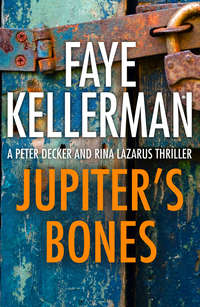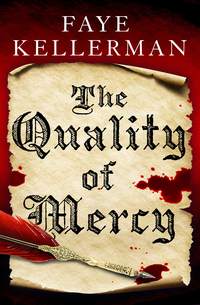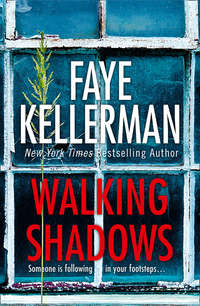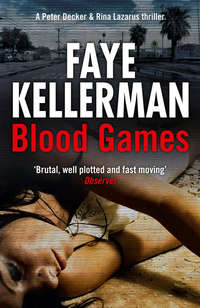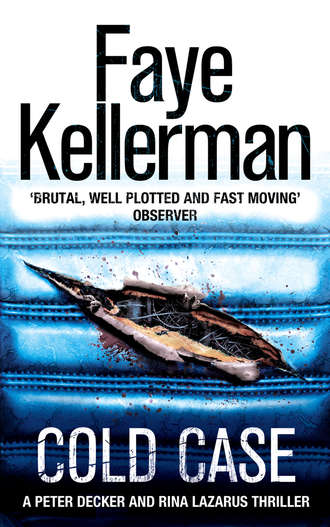
Полная версия
Cold Case
Still, the show went on. Marilyn mollified egos in the producer's absence and treated the gang on her tab. The wine flowed, the food kept on coming, and when they emptied out of the restaurant at a little past eleven, she felt that a good time had been had by all.
For her part, Eustis hardly ate a thing.
She drove to Primo's condo and let herself in with her key. As usual, the space was tidy with no signs of disturbance. Marilyn checked the development's gated parking lot and was quick to note that Primo's Mercedes wasn't in its allotted slot.
Her initial calls were to the police and highway patrol inquiring about accidents. When that turned into a goose egg, thank God, she called the police a second time to report Ekerling as a missing person.
The police were unimpressed by the urgency in her voice. She'd have to wait until Primo was missing for a longer period before they'd send someone to look into the disappearance. When it became clear that Primo wasn't going to show up on his own accord, the police sent a detective named Marsden Holly to talk to Marilyn.
Holly, upon hearing what Primo did for a living, offered alternative scenarios, most of them variations on his cutting town or being with another woman. Marilyn was insistent that neither was plausible. The detective took down the model, make, and license plate of the Mercedes and called it in. Ekerling remained a mystery until a cop noticed a ticketed Mercedes. When the vehicle turned up as hot, he reported the crime to GTA—grand theft auto.
Detective Cynthia Kutiel—Decker allowed himself a bit of pride here—noticed a sagging trunk. When the lid was popped, detectives discovered the partially decomposed body curled into the fetal position. The victim had been shot in the head execution style, his hands and feet bound tightly.
Homicide detectives were called in along with the coroner investigators.
They were followed by the techs and a police photographer.
Evidence was collected, pictures were taken, and fingerprints were lifted. The good news was that the fingerprints secured at the crime scene matched two lowlife petty criminals named Geraldo Perry and Travis Martel. Both teens had priors, although up to now, they had managed to eschew violence. Detectives Rip Garrett and Tito Diaz pointed out a trend of escalating crime in the boys' rap sheets and felt that they had finally crossed that line.
The teens were brought in and grilled in separate interview rooms. Both boys recited the same story and used the same defense. At around ten in the evening, the boys had wandered into Jonas Park—a known drug spot—looking to score weed. Instead they had found the lone Mercedes in an empty parking lot near the park. Both freely admitted to stealing the car, but neither confessed to killing Ekerling. They claimed they took the car joyriding: cruising Santa Monica Boulevard, then racing down Sunset at three in the morning, eventually abandoning the car in the Hollywood hills after the engine started to smoke.
Both were adamant about their innocence. They claimed they had no idea that Ekerling had been stuffed inside the trunk and was moldering in his own private coffin.
“Where'd you go after you abandoned the car?” Rip Garrett asked Travis Martel.
“We was hungry, man. We needed eats, nomasayin'? We went to Mel's, had some waffles. They was good. Then we called up some buds and axed them to pick us up.”
“And why would your buds pick you up, forty miles away from your house?”
“'Cause we told them we boosted a Benz and would give them the navigation system and the stereo for twenty bucks and a ride home. They said okay.”
“So then what happened?”
“They come to Mel's and order some waffles, too. I was still hungry, so I ordered a club with extra bacon. Then when we all was finished we went by the Benz and drove it into the hills where it was real quiet. We left the nav, but we boosted the stereo. It had took about five minutes.”
“When did you leave Hollywood?”
“Like four o'clock. Me and Gerry was tired.”
Rip and Tito didn't believe the jokers. They theorized that the bad boys were attempting to jack the Mercedes when Ekerling confronted them. Shots were fired, Primo was murdered. The kids stuffed the dead man into the trunk, drove the car forty miles away from the crime scene, and left the Mercedes in the Hollywood hills.
The buds of Travis and Geraldo—two dudes named Tyron and Leo—confirmed the teens' stories. The waitress at Mel's remembered all four boys. But the detectives remained unconvinced. So did the D.A. and a grand jury. Travis Martel and Geraldo Perry were arraigned for the crimes of carjacking and murder. Bail was denied. The teens were languishing in jail.
Decker regarded the photographs.
Geraldo Perry was five eight and 120 pounds, a thin teen with a scrawny mustache and a soul patch. His eyes were droopy and his shoulders were narrow. He looked like a hype.
Travis Martel was black but not the typical African American. He had wavy hair, mocha-colored skin, thick lips, an angular nose, and upward-slanted brown eyes. He was also five eight, thicker in build but not any sort of a muscleman. In his mug shot, the eyes engaged and challenged.
Primo Ekerling was six one, a solid two hundred pounds if Decker had to make a guess. He had a thick head of curly hair, dark brown eyes, and a jutting, cleft chin.
Decker was struck by some similarities between the Ekerling and Bennett Alston Little cases: same make of the cars, bodies stuffed in the trunk, public dump spots for the vehicles. But if Decker was to get anywhere, he needed to ramp up the connections. As it stood, there was nothing Decker could hang his hat on.
He put down the case file and googled Primo Ekerling; over a thousand references flashed across the monitor. The first few pages dealt with his shooting, but after those thinned, most of the articles had to do with his business as a producer and then his youthful stint as a punk rock star. It was interesting to note how a person could be almost a complete unknown and still have so many references.
Primo Ekerling had his backers. But he also had a number of detractors as evidenced by all of his lawsuits.
He was suing a band that he had produced for back payment.
He was suing a record company that had hired him for back payment.
He was suing a former member of his own defunct band—the Doodoo Sluts—for royalties from their “best of” CDs.
He was also suing a number of other record producers for back payment.
Decker read the articles carefully, trying to find Freddy Vitton's name, but that came up empty. Decker did notice that one of the many producers whom Ekerling was suing had also been a band member of the former Doodoo Sluts—a guy named Rudy Banks.
He picked up the Ekerling file, looked for Rudy's name but didn't find it anywhere. Not surprising because Martel and Perry had been arrested almost immediately, so why bother? And it wasn't a smart thing to start calling up Ekerling's critics and asking pointed questions. Someone might get pissed. Someone might call up Detective Rip Garrett or Detective Tito Diaz and start complaining about a nosy lieutenant from West Valley. And if they mentioned the name Decker, not only would he be in a tight spot, that lieutenant would also put his daughter in an even tighter spot.
Especially because two suspects were currently in custody and those two suspects had been in diapers or nonexistent when Bennett Alston Little had been murdered.
No, no, no, it would be an unwise thing to talk to Ekerling's adversaries. What Decker needed was one of Primo's allies.
He wrote himself a reminder to call Marilyn Eustis tomorrow morning.
CHAPTER 13
WHILE THE MORNING coffee was brewing, Decker turned on the family laptop. It was clogged with a plethora of different sites and icons and was ancient in a rapidly moving techno world. However, it still worked.
The Doodoo Sluts had gone through several transformations, but in its heyday eighteen years ago, it consisted of a quartet: Elvis Costello look-alikes who were, in turn, Buddy Holly look-alikes—four white boys in black suits, white shirts, thin black ties, and big round black-rimmed glasses. Their most successful track was entitled “Bang Me” and climbed its way to number eight on the Top 100 hit list. The song wasn't available in any routine download format.
Decker was still searching for the song or a “best of” CD that contained the song when Hannah walked into the kitchen. The teen was dressed in a full blue skirt and a white-collared polo top, the preferred uniform of the school. With her red hair, she could have doubled as the American flag. Decker closed the computer, convincing himself that he was spending some quality time with his elusive daughter. That usually translated into making her eggs and pouring her orange juice.
“How's it going?” he said cheerfully.
“You're taking me to school?”
“Is that okay?”
“I love your company, but your car doesn't have satellite radio. Can we listen to my CD mix?”
“Absolutely.”
“Thanks.” She plopped down on a kitchen chair, her eyes still full of sleep. “I'm not hungry, Abba. I'll eat later at school.”
“All they serve is sugar cereal and that's a terrible thing to eat in the morning. You get a blood sugar rush, and then you crash. You need protein.”
“I need another twenty hours of sleep.”
“What time did you get to bed?”
“It doesn't matter when I get to bed. It's when I wake up.”
“Well, if you get to bed earlier, it might be easier to wake up earlier.” He was sounding preachy this morning. “How about some scrambled eggs?”
“If you insist.”
Decker took out a pan and three eggs. She liked only one yolk and the rest egg whites. He gave the eggs more substance by adding a little milk and cheese. “I need your professional help.”
Hannah looked up. “My help?”
“What do you know about the punk scene?”
“You mean the real punk scene or the retro punk scene.”
“The original period. I'm interested in a group called the Doodoo Sluts. They peaked in the late eighties.”
Hannah's smile was genuine. “And the name's for real?”
“Would I lie?”
“Yes, but probably not about this. I've never heard of them, Abba. Personally, I never got punk rock, but I am sorry I missed the grunge scene.”
“That's too bad. I never understood Nirvana's appeal. Jake loved them.”
“They're not my favorite. I'm talking about Pearl Jam, Sound-garden, and Alice in Chains. But I digress. I have a friend who's a maven on original punk rock. What do you want to know?”
“Anything he or she can tell me about the Doodoo Sluts.”
“It's a he—Ari Fieger. He's a bit of a nerd and overly pompous, but he knows his stuff.”
Decker spooned the scrambled eggs onto a plate. “Here you go.”
“You're too good to me, Abba. And all I ever do is give you attitude.”
“You're a terrific daughter.”
“Now you're lying.”
“I'm telling the one-hundred-percent truth.” His cell phone rang: it was Marge. “Excuse me, sweetie. Yo.”
“I'm at the airport waiting for Continental to tell us how long we will be delayed. So far, it's an hour.”
“That doesn't sound good.”
“Weather, they say. It's always weather.”
“When in doubt, blame it on the weather. When is your interview with Darnell Arlington?”
“Not until eight in the evening. So far we're okay because I've built in an airline delay factor.”
“Marge, do you have your computer with you?”
“I do.”
“Does the wireless work?”
“It does. What do you need?”
“Everything you can find on the Doodoo Sluts. Spelled just like it sounds.” He heard her laughing on the other end. “Primo Ekerling was a member of the group. He was suing another former member named Rudy Banks. Ekerling is also involved in another suit with Banks … something about a record they co-produced and Banks withheld money.”
“Great. It'll give me something to do. Or should I say doodoo.”
Decker smiled. “I'll talk to you later.” He discontinued the call. “Ready?”
“Not really, but what's my choice other than malingering.”
“That won't get you anywhere. You'll just have to make up the work.” Decker hoisted her backpack. “What's in here? Lead?”
“Meaningless and out-of-date textbooks that you and Eema paid a fortune for.”
“You're going to hurt yourself carrying all this weight.”
Hannah hugged her father's arm. “That's why I need a big, strong abba.”
THE BUILDING WAS four stories of chrome and glass, a stone's throw away from where Suge Knight had set up offices for the notorious Death Row Records, the premier label of L.A. gangsta rap. While investigating a case years ago, Decker used to pass some of Suge's billboards perched atop the office building: people sitting on toilets and other offensive images. Now Tupac was dead and Suge was in jail. Ah, the fleeting phantom of fame.
Ekerling's office was on the second floor, sandwiched between an insurance agent and a guru named Om Chacra who sported a degree in Far Eastern and holistic medicine. The door was locked and there was no bell, so Decker knocked. The door opened but only a crack because it was bolted by a chain.
“Yes?”
“Lieutenant Decker of LAPD. I'm looking for Marilyn Eustis?”
“You found her. ID, please?”
Decker slipped his badge into the allotted space and waited. A moment later, the door opened and a slim, leggy blonde with a cigarette was giving him a quick once-over. She returned his billfold. “Can't be too sure nowadays. Come in. The place is a mess, so watch your step.”
She turned her back, and Decker followed her swaying hair and rear until she pointed to an empty folding chair. “Have a seat. I'll be back in a moment.”
Decker complied and studied Marilyn. She was dressed in black, and although she was attractive, she emitted nothing but nervous energy. Her blue eyes quivered as if they were bathing in adrenaline.
He looked around. It was a small room in utter chaos: papers and boxes everywhere with lots of shelves of CDs, most of which were jewel-box demos. A single pot of coffee sat by itself in a corner, looking forlorn. He saw her dragging over a chair and got up to help. “Are you in the process of moving?”
“Just cleaning out Primo's shit.” She plopped down. “Seeing if there was any money due. He seemed to be current. He was a lousy house keeper, but pretty good with the bills.” She rubbed her neck. “So why are you here? I thought the police had the punks in custody.”
“They do.”
“So I repeat, why are you here?”
Decker leaned toward her. “This, in no way, is a reflection on the detectives involved in Mr. Ekerling's case. I'm sure that the perpetrators in custody did it. I'm here because Primo Ekerling's murder was similar to one that happened over fifteen years ago involving a man named Bennett Alston Little.” He waited for the name to register. When it didn't, he said, “The case has been reopened. I'm in charge and I just want to make sure that the coincidences are merely that— coincidences.”
Marilyn crossed and uncrossed her slender legs. She was wearing a tight black skirt that showed lots of skin. “What kind of coincidences?”
Decker told her about the cars and the bodies in the trunks plus the fact that both cases involved public parks after dark.
She continued to stare. “You're thinking like a serial killer?”
“The murders were fifteen years apart.”
“A choosy serial killer.”
Decker didn't dare smile, but her black sense of humor was better than bitterness. “I'm trying to see if there was a direct link to the two men, and so far I haven't come up with anything. So I'd like to get a little background on Primo. What can you tell me about him?”
She shrugged. “Primo was born in New York. I met him in New York. I know that he spent some time out here when he was involved with the punk music scene in the late eighties to the early nineties.”
“The Doodoo Sluts.”
“You've done your homework.”
“Not completely but while looking up Primo on the Internet, I noticed he was involved in several lawsuits with a man named Rudy Banks who was also in the Doodoo Sluts. What can you tell me about that?”
“You suspect Rudy?”
“I don't even know Rudy enough to suspect him. But I can do basic math. If Mr. Ekerling and Rudy were out in the L.A. scene in the late eighties to early nineties, that would be right around the time that Ben Little was murdered.”
She puffed on her cigarette, but blew the smoke the other way. “And?”
“I have no and, Ms. Eustis. I'm just trying to gather information.”
“Rudy can be summed up with a single word. Schmuck! Now if he would have been murdered, no one would have been surprised. The man only had enemies.”
“Why's that?”
“Because he rips off people habitually. He makes compilations. He steals songs but won't pay royalties. He also plagiarizes songs that other people write and won't pay them for it. Sometimes he actually makes money legitimately. Primo and Rudy co-produced a retrospective on the L.A. punk scene with current artists doing old favorites. The CD album made a little money—one of the cuts even made it to iTunes for a brief period of time—but Rudy took all the profits.”
“How does he get away with it?”
“When people complain, he says sue me. Some do, but most don't.”
“Where does Rudy get the money for legal work?”
“The son of a bitch is smart. Ten years ago, right after the group broke up, Rudy went to law school. One of those nighttime rip-off deals where none of the students ever pass the bar. Guess what?”
“He passed the bar.”
“He specialized in intellectual property. He knows the ins and outs. Let me tell you something, Lieutenant, it's hard to get a judge to even listen to your case. Ninety-nine percent of these cases get thrown out on the first round. Primo let Rudy have a free ride for years just because it wasn't worth it.”
“So what changed his mind?”
“Rudy put out a retrospective CD of the Doodoo Sluts without giving Primo, Liam, and Ryan—the other guys in the band—any money whatsoever. The three of them got together and sued. It stopped the release of the CD—at least temporarily—and so far, no one has made a penny except Rudy.”
“So what would happen if all three members died? Would Rudy get all the profits, or would it go to the estates of the members?”
“I have no idea.” She paused and smoked her cigarette. “Rudy is always suing someone or someone is suing him. It's a way of life for him. Still, I don't see him as having anything to do with Primo's death.”
Another pause.
“Although I'm not quite sure that I buy the carjacking gone wrong thing.” She shook her head and regarded Decker's eyes. “You don't buy it, either. That's why you're here.”
“I'm just gathering information. Why don't you buy it?”
“The death seemed calculated. I saw the interview tape of the punk … I guess he's one of the punks. The kid sounded as if he couldn't plan a fart after eating beans.”
“Do you remember the name of the interviewee you saw?”
“No. He was black.”
“Travis Martel.”
“Yeah, that's it.” Marilyn finished her cigarette and lit another. “But what do I know? In the meantime, I'm careful. If it wasn't those jackasses, then maybe it was something more personal. So then maybe I should be looking over my shoulder.”
“Anyone specifically in mind?”
“No, and that's why I'm nervous. The recording business attracts a whole lot of psychos. Some even have talent. It's all marketing these days. What you sound like is irrelevant. It's how you present.”
“I'm sure that's true. How did Rudy meet Primo?”
“I don't really know. I came into Primo's life long after the split of the Doodoo Sluts. We met at AA. I've been sober for over five years. Primo, so far as I know, had been sober for a little longer, but who knows?”
“You think that Primo might have slipped up?”
She blew out smoke. “When I heard that this punk carjacked the Mercedes from Jonas Park, my first thought was: what the hell was Primo doing in a park in southeast L.A. alone at night. Almost immediately I answered my own question. He was probably sucking on a bottle or getting high.”
“Did you ask the coroner if he had alcohol or drugs in his blood?”
“Why would I bother doing that?” She stared at him. “It wasn't what killed him … directly.”
“It would be interesting to know.”
“Yeah, it would explain why he gave up without a fight. If he was drunk or stoned, he probably didn't know what was flying. As a sober guy, he could take care of himself.”
Decker wondered if a comprehensive toxic screen had been ordered at autopsy. He made a note to check it out.
“He was a really good producer. Not that anyone cared. The entire industry is in the throes of a shakeup. The CD is a dinosaur. Everything is downloaded from song-sharing sites. And lots of new groups are bypassing traditional producers and selling their own shit on the Internet. Primo's jobs were fewer and fewer. If he had succumbed to drinking, I wouldn't have been surprised.”
“And you said he would have probably resisted if he wasn't drunk?”
“I didn't know Primo when he drank. I don't know if he was a mean drunk or not. As a man, I can tell you he was a good guy.” She blinked back tears. “If you find anything new, let me know.”
“I will. And I'd appreciate your keeping the conversation quiet. The detectives assigned to Primo's murder wouldn't like me butting my nose into their business.” He paused. “You wouldn't happen to have Rudy Banks's phone number.”
“Do I have it?” She laughed derisively. “I must have called it a thousand times. Sometimes he even answers.”
“Thanks. That would save me some work. And just so I don't over-focus on Rudy Banks, is there anyone else who might have had a stake in hurting Primo?”
She took a deep drag on her cigarette. “Who knows? In this business, you make enemies without even knowing it.”
CHAPTER 14
THE MESSAGE POPPED onto the machine after ten rings, giving the caller adequate time to hang up. If the male voice was that of Rudy Banks, his tonal quality was raspy, as if he had a chronic case of laryngitis. Decker left his name, rank, and phone number. From past history, intuition, and experience, he was going to have to chase the sucker down. He hung up and began to sort through a falling tower of pink message slips when Oliver came into the office and sat down.
Decker barely glanced up, but his eyes had enough time to take in Scott's jaunty outfit, a glen plaid jacket over olive pants. “You're looking very English today.”
“Fifty bucks for the jacket.” Oliver smoothed the lapel. “Brand new. I found out about Ben and Melinda Little's finances. They were in good shape.”
The way Oliver spoke made Decker wonder. “Do you mean good shape or very good shape?”
“I mean outstanding shape.”
“As in way too good for a teacher?”
“As in skirting the boundaries of what would be logical,” Oliver told him. “And that got me thinking. How did a guy on a teacher's salary without a working wife afford such a nice house and an expensive car?”
“I thought he was also a vice principal … which probably meant he had a little more lunch money.”
“At the time, he was making forty-one thou a year plus health and benefits, which was pretty good back then, but it doesn't explain how he amassed personal savings and
Конец ознакомительного фрагмента.




